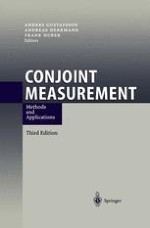2003 | OriginalPaper | Buchkapitel
Adaptive Conjoint Analysis: Understanding the Methodology and Assessing Reliability and Validity
verfasst von : Andreas Herrmann, Dirk Schmidt-Gallas, Frank Huber
Erschienen in: Conjoint Measurement
Verlag: Springer Berlin Heidelberg
Enthalten in: Professional Book Archive
Aktivieren Sie unsere intelligente Suche, um passende Fachinhalte oder Patente zu finden.
Wählen Sie Textabschnitte aus um mit Künstlicher Intelligenz passenden Patente zu finden. powered by
Markieren Sie Textabschnitte, um KI-gestützt weitere passende Inhalte zu finden. powered by
It is widely known that preference is not an observable phenomenon per se but a construct and in so far „a term specifically designed for a special scientific purpose generally to organize knowledge and direct research in attempt to describe or explain some aspect of nature“ (Peter 1981, 134) for which „[...] measures can be developed which at least partially represent the constructs.“ (Peter and Churchill 1986, 1). Consequently, measuring a construct implies that „numbers are assigned to objects [...] in such a way that the relations between the numbers reflect the relations between the objects [...] with respect to the characteristic involved“ (Green, Tull and Albaum 1988, 243).
